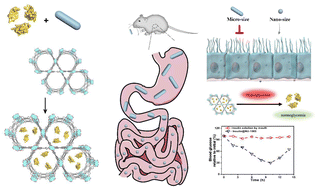The oral delivery of protein-based drugs is of great significance, but faces various obstacles, including the deactivation of proteins by the low pH in the stomach and the high concentration of protease, poor transport through intestinal bio-barriers, etc. Herein, we present an acid-resistant metal–organic framework (MOF), NU-1000, in which insulin (Ins, a model protein) was loaded with high capacity (Ins@NU-1000) through the pseudo second-order kinetic model and Langmuir isotherm model. Ins@NU-1000 protects Ins from deactivation in the stomach acid environment and releases it in the intestine through the transformation of the micro-sized rod particles into spherical nanoparticles. Interestingly, the rod particles exhibit long-term retention in the intestine, and Ins is efficiently transported by the shrunk nanoparticles through intestinal bio-barriers and released into the blood, resulting in significant oral hypoglycemic effects (lasting more than 16 h after a single oral administration). Our findings demonstrate that switching the physical properties of the delivery vehicle, such as the shape and size, can contribute to the success of oral protein administration.

